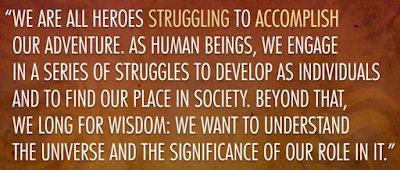Weel 4 Lab: Crash Course Mythology
For this StoryLab assignment, I watched three videos from the YouTube Channel Crash Course (the Mythology series) about the definition and theories of myth, and also the concept of "the Hero's Journey", or the monomyth. I've been a subscriber to the channel since my freshman year at OU, but had never explored the mythology series. These videos were a great introduction not just to the channel, but the entire field of mythology in general. There are so many definitions of myths, including those that correlate myths to lies or falsehoods. I think that's a usage that's pretty common in the West, especially in America. If someone references some news headline making some ridiculous or extravagant claim, they are sometimes met with the response, "That's just a myth." As in, "That isn't true." The purpose of the video series is not to determine whether certain myths are true; the host, Mike Rugnetta, leaves that up to the viewers to determine. I appreciate the creators' honest attempt to remain unbiased. The series focuses instead on myths as stories
The myths we're reading in this class have innumerable possible interpretations, and are often told in numerous versions, none of which might be the original. The question of why humans create them also has innumerable possible answers. The interplay of psychology and mythology is especially appealing to me; in the study of International Relations, psychology plays a huge role, though it has only been in the past couple of decades that IR theorists have actually begun to take psychological theories into account when trying to explain the behavior of different actors in the international system. So seeing that there has been a lot of dialogue between psychology and mythology was comforting to me. I especially liked Carl Jung's theory of the source of all myths being this kind of reservoir of collective human consciousness. So many myths and legends from all over the world share similar patterns and are trying to explain similar or identical phenomena, so the idea that there is this singular root to all of them, and that all of humanity is connected on a subconscious level, is both incredibly trippy but also a very powerful idea.
The idea of patterns brings us to the third video, which is about hero's journey, also called the monomyth. Developed by mythologist Joseph Campbell in the 90s, the monomyth is this overlying template, or maybe a road map, that allows readers to draw comparisons between hero stories across time and space. The hero's journey as defined by Campbell is divided into three sections (separation, trials and victories of initiation, and return), with 17 "stops" throughout. Mike reminds us that not every hero story has all of these 17 elements, or matches the template perfectly, but that they generally do follow a similar pattern. The thing I like most about this concept is Campbell's connection of mythological heroes to the everyday individual. Heroes, according to Campbell, tell us about ourselves, to the point that each of us is a hero going on our own journey throughout the course of our lives. Mythologists Eva Thury and Margaret Devinney summarize it in the following quote:
There's something very uplifting about that idea, that no matter how small or insignificant we might feel, we are each on our own journey with our own trials and victories. It ties back to what we've learned about the Growth Mindset, and how the focus should be on individual personal growth and less about comparing ourselves to standardized benchmarks. Maybe it's sappy, but I really connected with this concept, and I hope some of you guys do, too.
The myths we're reading in this class have innumerable possible interpretations, and are often told in numerous versions, none of which might be the original. The question of why humans create them also has innumerable possible answers. The interplay of psychology and mythology is especially appealing to me; in the study of International Relations, psychology plays a huge role, though it has only been in the past couple of decades that IR theorists have actually begun to take psychological theories into account when trying to explain the behavior of different actors in the international system. So seeing that there has been a lot of dialogue between psychology and mythology was comforting to me. I especially liked Carl Jung's theory of the source of all myths being this kind of reservoir of collective human consciousness. So many myths and legends from all over the world share similar patterns and are trying to explain similar or identical phenomena, so the idea that there is this singular root to all of them, and that all of humanity is connected on a subconscious level, is both incredibly trippy but also a very powerful idea.
The idea of patterns brings us to the third video, which is about hero's journey, also called the monomyth. Developed by mythologist Joseph Campbell in the 90s, the monomyth is this overlying template, or maybe a road map, that allows readers to draw comparisons between hero stories across time and space. The hero's journey as defined by Campbell is divided into three sections (separation, trials and victories of initiation, and return), with 17 "stops" throughout. Mike reminds us that not every hero story has all of these 17 elements, or matches the template perfectly, but that they generally do follow a similar pattern. The thing I like most about this concept is Campbell's connection of mythological heroes to the everyday individual. Heroes, according to Campbell, tell us about ourselves, to the point that each of us is a hero going on our own journey throughout the course of our lives. Mythologists Eva Thury and Margaret Devinney summarize it in the following quote:
 |
| Thury and Devinney's explanation of the hero's journey on a personal level. (Source: Crash Course) |
Source: Crash Course Mythology



Comments
Post a Comment